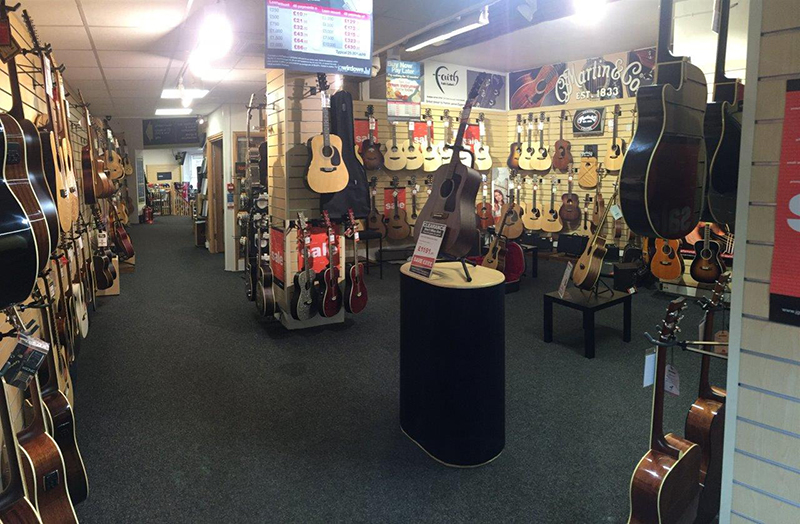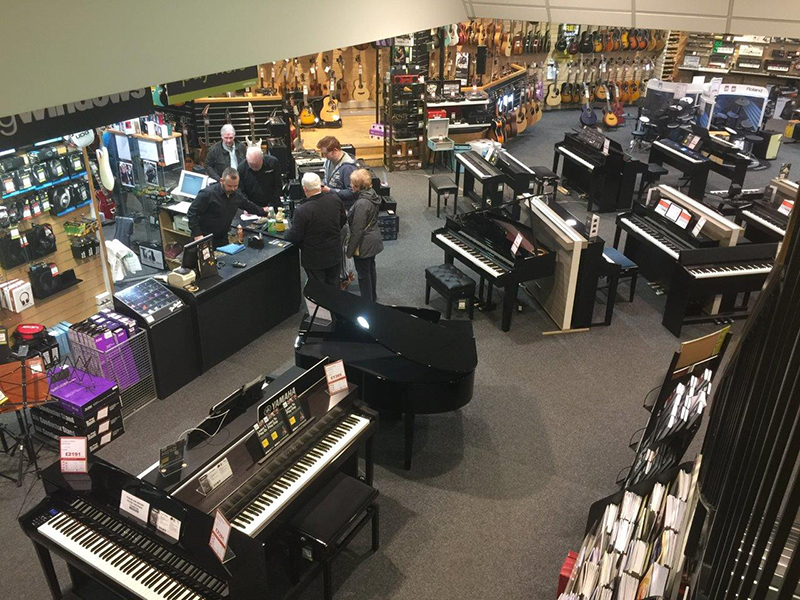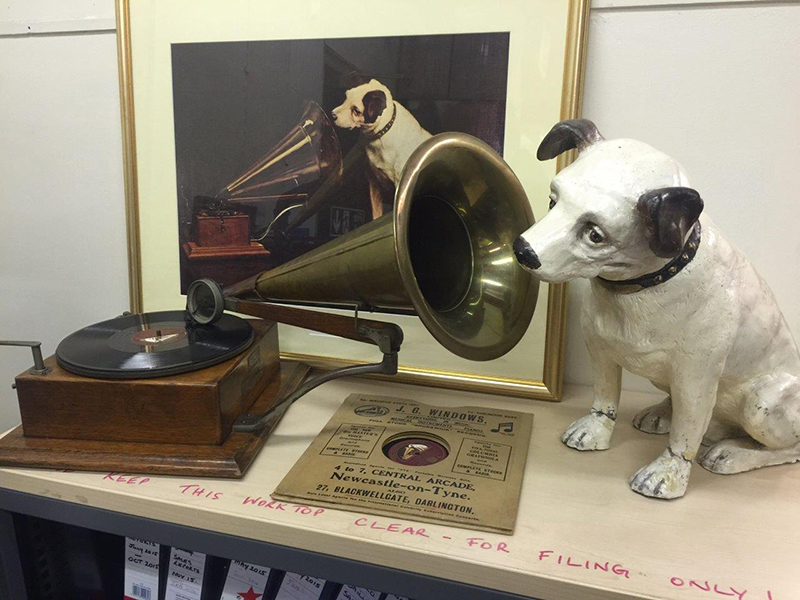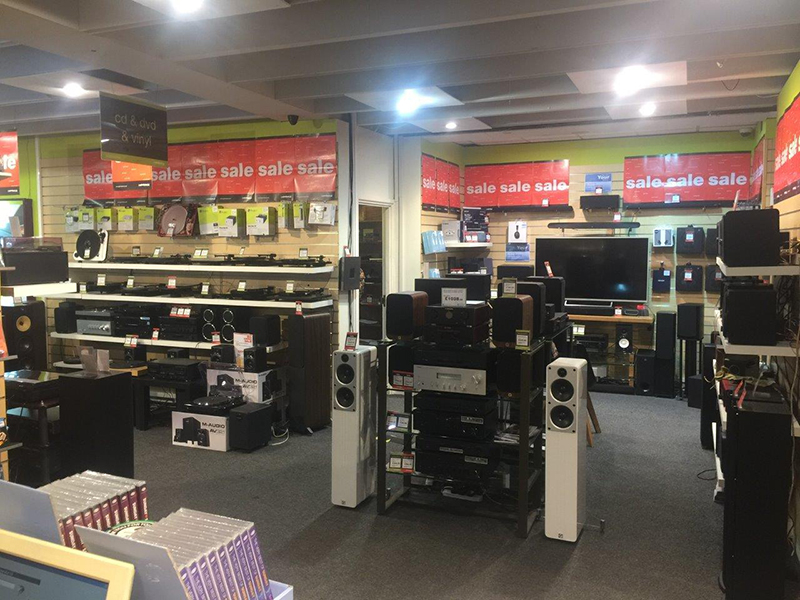
J.G Windows – the past has a future
Talking Heads – MIN interviews leading figures from the MI industry to find out what’s on their minds.
MIN’s editor, Gary Cooper, speaks with Rupert Bradbury, Managing Director of one of the longest established music shops in the UK, J.G. Windows, renowned in Newcastle upon Tyne and throughout the North East and perhaps the epitome of the traditional bricks and mortar music shop.
Facing all the challenges of the High Street music shop but compounded by being based in a city centre (two of them, in fact) J.G. Windows has a formidable commander in Rupert Bradbury. With long experience at the cutting edge of music retail, including a long and successful spell with Roland, both as a rep and then running its in-store retail concessions, he has strong opinions about the state of the industry and what needs to be done to make it work. Faced with competition from e-tailers and discounters, falling city centre footfall and manufacturers squeezing retailer margins, many believe the type of shops he runs are living on borrowed time. He is out to prove the pundits wrong.

GC: Would you give us a short sketch of JG Windows, please? An idea of the company’s size, position and style.
RB: Short sketch… 110-year-old music retail company, selling everything from musical instruments to Hi-Fi, from printed music to vinyl/CDs/DVDs, that belonged to the Windows family until 2006, when it was bought from them by the current directors. We now have two branches (having recently closed our Darlington branch). One very large branch, about 14,000sq feet, still located in its original location in the beautiful Central Arcade, in the centre of Newcastle upon Tyne, and a second branch, about 4,500 feet that we took over in 2009, in Gateshead’s Metrocentre. It’s very much part of the North East heritage, and with that we feel hugely responsible for one of the North East’s most well-known local brand names, as well as of course for the 35 people who work for the company.

GC: Would you give us a brief personal CV as well, please? How you came to Roland, what you did there and how you moved from Roland to Windows.
RB: Well, I was a graduate from Newcastle University, and promised myself an Atari 1040STE with Notator (those were the days!) after I finished my exams back in 1992! I popped into Windows to sort that out (obviously using my student loan), found there was a vacancy selling digital pianos and keyboards, and took what was meant to be a short-term job, until I found myself a place on a graduate training scheme, within one of the major high street retailers… four years later I was still there, having got “sucked in” to our industry. In fact, it was the then Yamaha EKB rep (Jeremy Middleton), who alerted me to the fact that Roland were looking to employ a sales person in the North, focussing on digital piano sales, and the rest, as they say is history…. Got the job and got to know some of the many friendly (mainly friendly!) faces of our small industry. I spent two years out and about on the road, then moved to Swansea and ran the CK sales office/customer service department for three years. The next five years of my time at Roland was running and developing the “concessions within department stores” programme (so working with the likes of Debenhams, House of Fraaser and Allders etc). That was fascinating and for me very enjoyable experience, working with some of the “big players” and discovering how they ran their businesses. I must say, when I left Windows in 1996, to join Roland, I knew that at some point, I’d love to take the helm back at the JGW, partly because I knew there was clearly an opportunity and challenge to develop the business, secondly because I love the North East, and thirdly, because retail really is the sharp end of our business…

GC: What do you see as Windows’ greatest strength as a retailer?
RB: Whilst sometimes, it can be a hindrance, without doubt, the name and reputation of our company in the North East is at the top of the list. And with a strong name, comes a strong and loyal customer base (perhaps that’s becoming more challenging now…). There’s never a shortage of staff that join us, wanting to be part of the J.G. Windows “culture”, and very importantly its very broad offering of product, so we’re never totally reliant on one product type. I bet there aren’t many other music retailers who see Father’s Day as a major promotional opportunity (selling local DVD product). And finally, the fact that we have two large branches, close together, but serving two quite different customer bases, makes for quite a cocktail.

GC: Why did you decide to stick to the traditional retail formula of prestige sites in main shopping areas and not follow the online/discount path or cheaper locations?
RB: In all honesty, the site in the Central Arcade, is the heart of the brand. If we relocated from that site, you’d be missing exactly what Windows is all about. And finding ourselves running a shop or two on “prestige” sites, to a degree limits your options, in that we have to offer the very best retail experience possible. In my heart I always say that we are a professional retailer that happens to sell musical products (which fortunately we are all passionate about), rather than starting with the passion and then wondering if we can make a business out of it. I love bricks and mortar retailing and is what gets me out of bed in the morning. We all know, in our industry, it’s what our customers really do need, in the most part, to make a properly informed decision when buying a musical instrument. I bet I’d struggle to find many customers who went on line with a budget of around £500 to buy a digital piano, and ended up quite happily spending £1,500-£2,000 or even more on a much better instrument…. The internet simply cannot do that – or optimistically, not as regularly as you can in a store.

One of the challenges is drawing this to the attention of would-be and existing customers. Having said all of that, we are currently spending some significant effort and time developing our Internet business, and whilst that side of our business model is relatively small, it’s certainly not insignificant. I believe we can do both, although I’d be the first person to say, that our store in the centre of Newcastle, wouldn’t be your first choice to run any kind of internet/mail order business!
GC: As a traditional ‘bricks and mortar’ retailer, what do you see as your greatest current challenge: Margins? Rents and taxes? Internet competition?
RB: All of the above….and more. But, so much of it comes down to margin opportunity. If there was more margin available, then rents, taxes, staff costs, training costs, service charges, could be managed more effectively, and stores continue to evolve. We’re not just about “surviving”.
One of the other key problems is that many bricks and mortar retailers, really don’t add value – or perhaps enough value – in their stores. Or perhaps the customer service is not exceptional? We’ve all been to a store where you’re ignored, or the staff simply don’t know their stuff? So then, who can blame consumers for shopping on line? ToysRus is perhaps a great example of not really adding much to what the Internet already offers (i.e. very superficially a load of products on display with a price ticket….) The actual problem occurs then when customers don’t differentiate between retailers that genuinely would add value to the shopping experience and those that don’t. And I genuinely believe in our industry, the customer loses out (where we really can add value), even if they think they’ve just saved themselves some money on an instrument purchase online.
The Internet is essentially allowing the public to sleepwalk us into dying high streets. Darlington, being close to home for J.G. Windows, is a truly perfect example, with M&S closing, House of Fraser soon to close, and BHS gone a few years ago. This was a vibrant town and has a population of over 100,000 people. It’s now a city littered with “To Let” boards and not a single music shop.
GC: Do you feel suppliers understand what retailers need to succeed?
RB: I think over the past few months, suppliers are probably learning a lot more… but it does vary a lot from supplier to supplier, when it comes to the actual every day nuts and bolts of what needs to happen and when. Let’s be honest, it’s not until business is significantly affected for whatever reason, for a prolonged period of time, that the reality of what retailers require – on a day to day and month to month basis – really starts to hit home. Despite what’s going on in our industry right now, requirements haven’t really changed over the last 10 years – in terms of the ability to make enough money in a very small industry, and offer the level of service that suppliers, customers and retailers feel is appropriate. But until now, most retailers continued to buy what they’d always bought, and to a degree, simply taken “the hit” themselves. Now they have nowhere to go, to take that hit, so they stop buying, hold less back up stock, and the supplier, perhaps start to feel the pain. I do remember when I left Roland and joined J.G. Windows, one of the first things that struck me, was that in my Roland days, I totally didn’t appreciate the simply enormous variety of activities and suppliers that in the retailer’s world, needed attention. At the most basic level, J.G. Windows deal with around at least 150 suppliers regularly, and not one is the same as another. So, there’s an enormous amount of plate spinning to be done, just in terms of buying product, never mind promoting it, selling it, displaying it, training staff. How easy life would be if we only had to deal with one range of products and sell to the same bunch of customers month in and month out. I know I’m being a bit simplistic, and I’m not actually having a pop here, but you get the idea…!
GC: So what could suppliers do to help retailers survive and prosper?
RB: Assuming we’re still talking about bricks and mortar retailers, it’s really very simple in theory, less so in practice…. IF as ALL suppliers I speak to, and all bricks and mortar retailers I know of, and probably some Internet retailers too, believe that we need showrooms for customers to try and experience products, they HAVE to find a way of allowing those companies with significantly higher overheads due to their locations and the quality of retail experience offered, to make the numbers stack up. It really is that simple. If they don’t, then our industry, at best, will look like the Hi-Fi trade:

In Newcastle City Centre, the only place you can see a decent choice of two channel Hi-Fi, is J.G .Windows (and we’ve really only got back into it in a big way, in the last six months). “Richer Sounds” is the only other Hi-Fi shop in the centre of Newcastle, and it’s certainly more focussed on TVs and Audio Visual, rather than two channel products. In Newcastle, 10 years ago, there were at least half a dozen places you could go to listen and buy Hi-Fi. I have to say, I couldn’t get the Hi-Fi thing to work if that was all we sold though… I can totally see our industry going this way with the current challenges we’re facing.
I appreciate the legal issues here, but I’m certainly having some constructive conversations with a number of our suppliers, where we’re having all kinds of discussions as to the various ways we can make things work going forward. Who knows where it will end up, but at least we’re talking!

GC: Do you think suppliers have a clear view of why they need retailers? And, come to that, do they really need them? Could online sales with retailers working on lower margins sell just as many products?
RB: I think most suppliers really do have a clear view of why they need retailers, and yes, they know they do need them. I go back to my point about “top down selling”. Something that the Internet knows nothing about… I can’t imagine many £3,000 saxophones being sold, if they generally weren’t available to try anywhere (which they wouldn’t be if margins were so tight, that you couldn’t carry the range of stock). I do sometimes wonder if not only suppliers, but also some retailers (online and high street), understand that low margin, equals less cash, which means less money not only to pay for overheads, but also to spend on choice of stock.

There really aren’t any suppliers who could even get close to running their own stores. Their product ranges on their own are too limited to make the numbers stack up. The volume simply isn’t there. And customers want to try a variety of products from different manufacturers. Don’t forget we’re not the car industry, where most households have at least one car. And even if in some magical way, the high street or Internet was full of manufacturers selling direct, a supplier’s “double margin” would very quickly be eroded as each supplier then started competing with each other and started to incur all the costs that retailers incur and have to spend money on.
GC: Staff training is an important aspect of successful retailing. Do you find it hard to recruit suitable staff and how do you approach training?
RB: We have a great team of people working for us, with massively varying experiences and skill sets. Because we stock such a wide range of products, we also need more staff. The person you want to sell classical CDs (probably listens to Radio 3 day in and day out), is almost certainly not the same person who is going to sell a flute, never mind the latest guitar effects pedal. So, training requirements are also extremely varied. We spend a reasonable amount of money with bespoke training courses– as well as our own on-line training platform. We also spend time and money sending people off our own back to visit suppliers, to live and breath the products, so they really do have a greater understanding. As I type this for example, we have four people heading to Kent (from Newcastle), to spend a day at Worldwind, with the team there. That costs time and money.
GC: Compared with even a decade ago there are now far fewer music shops in the UK. Where do you think we will be in another ten years time?
RB: I bet there are a lot of people asking that question now….
I’ve just googled how many cities there are in the UK, and the answer is 69. So again, assuming the question is about bricks and mortar music stores, and I’m not including recorded music (vinyl, CDs etc), then I think it’s a fair assumption to say that all cities will have some kind of musical instrument shop in them. I suspect they’ll have to be doing more than just selling musical instruments. And I wonder how involved suppliers will be in the model. I wonder who will actually be doing the selling? I’m not sure I’d put much money on more than two per city? I’m just comparing to the Hi-Fi trade… which is considerably bigger. In 10 years’ time, I think you’ll struggle to find many, if any music shops in your average UK town.
GC: Back to Windows, have you any plans to improve and/or grow the business that you can talk about?
RB: Right now, we are investing significant time and money in the web (although ensuring that it’s profitable business, not just about turnover). But obviously it’s not our core business, nor in the next three years is it likely to be. For us, I want to make sure that we are one of the remaining (and one of the best) fifty to hundred or so bricks and mortar retail companies still on the high-street. And I want us to remain a general music store, rather than a specialist in one field. That has done Windows well over the last 110 years. The retail experience has to be SO good – comparable with any big name high street retailer. Anything less, just won’t cut the mustard – and I have to say in our industry that’s one reason we’re continuing to see so many shops close. I think it’s about finding your strengths and really playing to them. And it goes without saying that we will have to do more than sell products and ensure we have more “experiential” activities in store of course.

GC: If you woke up tomorrow morning in an alternate universe in which you owned a single traditional ‘Mom and Pop’ type music shop in a struggling town, what would be your strategy for survival?
RB: Pray? Lottery? Close it?
In all seriousness, to make a sensible living, for all involved, I genuinely don’t think it can be done, with any kind of longevity now in a small struggling town. With consumers being led down the “it’s all about the price” road in the media and expecting choice, service and the kitchen sink for good measure, it’s almost an impossible task. (I hasten to add, it clearly isn’t all about price, otherwise Waitrose, would have shut down years ago!). The scenario you describe was our situation in Darlington and we closed the store in May. Despite it being profitable, it simply was more effort, than it was really worth certainly from a financial point of view… and tied up too much cash in stock.
GC: Finally, how do you see the way forward for the industry in general?
RB: I think one of the most important things for our industry, is for suppliers and retailers to truly appreciate each other’s situation – in some detail. It’s no good just talking about “Game Changing Times”, and yet still carry on with every day activities as if nothing has changed. We’re probably all guilty to varying degrees, of still just thinking that eventually, everything will just work itself out…
In some way, shape or form, musical products are going to continue to be sold, and for the industry to survive, much of that will have to be in a showroom, not on line – that is unless we believe that all parties can survive selling products that are under £1,000. Suppliers must grasp the genuine costs of running a decent store on a high street (because either they’ll want to continue to supply existing retailers, or in some way shape or form, they’ll end up trying to do it themselves!).

But somehow, we need politicians to understand that the lowest price, is NOT the best deal for consumers. Otherwise the high street will be dead. And if the high street is dead, the knock-on effect is unimaginable…. Our Newcastle shop is owned by Royal London – a pension fund, like many large retail units on the high street. No shops = no income for pension pots… never mind more people unemployed. A job for the MIA here perhaps…?
I have to say, I’m not sure which side of the fence I’d rather be on right now…. Retailer or supplier….!
MIN thanks Rupert Bradbury for the considerable time and effort he put into this feature. If you have an opinion about the MI business and would like the opportunity to reach our industry-wide readership, please contact our editor, Gary Cooper – gary@musicinstrumentnews.co.uk
The post J.G Windows – the past has a future appeared first on Music Instrument News.
Source: musicinstrumentnews.co.uk




